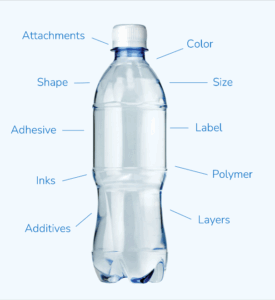The packaging industry has long faced a difficult challenge – ensuring oxygen-sensitive products maintain their shelf life without compromising recyclability. For years, traditional oxygen barrier technologies have complicated PET recycling streams, reducing the quality of post-consumer resin and limiting opportunities for circularity.
Ring Container Technologies’ BarrierGuard® OxygenSmart™ (BGOS) has changed that narrative. As the first oxygen barrier system formally recognized by the Association of Plastic Recyclers (APR) as non-detrimental to clear PET recycling, BGOS demonstrates that brands no longer need to choose between product protection and sustainability.
Overcoming recycling challenges
Historically, barrier additives created significant problems for PET recyclers. These additives often caused discoloration, haze, or cloudy appearances in recycled PET, lowering its quality and limiting its applications in premium packaging. According to the APR Design® Guide, many barrier features were classified as “detrimental,” meaning they impaired the value and usability of recycled resin. 
BGOS addresses this long-standing issue. Its unique formulation has received APR Critical Guidance Recognition, confirming its compatibility with commercial recycling processes. This recognition ensures that packaging containing BGOS contributes to a high-quality post-consumer resin (PCR) stream rather than degrading it. For brands, this means packaging can achieve superior barrier protection while supporting the future supply of recycled PET.
Superior shelf life with less material
Protecting products from oxygen ingress is critical for maintaining freshness, flavor, and overall quality. Traditional multilayer or monolayer systems require high levels of barrier material, increasing weight and cost.
BGOS offers a better alternative. During independent evaluations, BGOS demonstrated a 2.5-fold reduction in oxygen ingress over a 12-month period compared to other barrier systems. These results, measured with precision oxygen transmission analysis, confirm that BGOS achieves superior performance with significantly less barrier material.
Additionally, BGOS is lighter than competing technologies – up to 12% lighter in certain bottle sizes – lessening both material use and transportation emissions. This cuts costs and supports broader environmental responsibility goals by lowering the overall carbon footprint of packaging for brands.
Recognition and certification
The APR testing and certification process is one of the most rigorous in the packaging industry. To receive Critical Guidance Recognition, BGOS underwent a laboratory-scale evaluation to certify its compatibility with PET recycling streams. This process required independent third-party testing at every step, confirming that BGOS bottles behave like standard PET during collection, sorting, reprocessing, and remanufacturing.
For Ring Container Technologies, this recognition affirms years of research and development investments and solidifies BGOS as a breakthrough in sustainable packaging. For the industry, it provides reassurance for brands that adopting BGOS will support, not compromise, efforts to build a healthy recycling ecosystem.
Unlocking recyclability and rPET integration
One of BGOS’s most compelling advantages is its ability to seamlessly integrate recycled PET (rPET) without lowering barrier effectiveness or shelf life. Other oxygen barrier systems often require higher concentrations of barrier material when rPET is used, limiting their scalability.
BGOS avoids this problem. By maintaining performance even with high rPET content, BGOS reduces reliance on virgin fossil feedstock while supporting regulatory requirements and customer expectations for higher recycled content. This makes BGOS a practical solution for brands pursuing aggressive sustainability targets.
Applications across industries
Oxygen-sensitive foods and beverages face unique packaging challenges. Products like ketchup, pasta sauce, salsas, jams, olive oil, baby food, and instant coffee all degrade when exposed to oxygen, resulting in flavor loss, color changes, nutrient degradation, and spoilage.
BGOS provides a customizable barrier that can extend shelf life for up to 24 months, depending on the product’s needs. This flexibility allows brands to tailor oxygen protection to specific categories without over-engineering packaging or adding unnecessary material.
Long-term benefits for recycling infrastructure
The adoption of BGOS has implications beyond individual brands. By eliminating detrimental effects on PET recycling, BGOS strengthens the overall recycling system and expands the availability of high-quality PCR. This benefits recyclers by improving feedstock consistency and helps packaging manufacturers by ensuring access to better materials.
In the long run, innovations like BGOS accelerate progress toward a circular economy, where plastics are designed to be reused, recycled, and reintegrated into new packaging. For policymakers and consumers, BGOS represents a tangible example of how science and innovation can resolve real-world challenges at the intersection of performance and sustainability.
Breaking barriers
BarrierGuard® OxygenSmart™ demonstrates that sustainable packaging does not require compromise. By delivering superior oxygen protection with less material, enabling rPET integration, and maintaining compatibility with recycling streams, BGOS has set a new benchmark for the industry.
At Ring Container Technologies, we believe innovations like BGOS are critical steps in building a future where packaging drives both business success and environmental progress.

